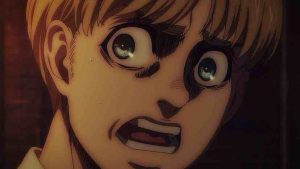 It’s interesting to me that I found the second half of this episode so much more engaging than the first – quite excellent, in fact. The obvious suspect is that’s when the narrative shifted away from the main cast and onto Gabi, Falco and his brother. To be honest I find everything surrounding Reiner especially but also Armin (who were probably my two favorite characters at one time) so ridiculous at this point that I just want their scenes to be over. And Mikasa and Eren were ridiculous from the get-go.
It’s interesting to me that I found the second half of this episode so much more engaging than the first – quite excellent, in fact. The obvious suspect is that’s when the narrative shifted away from the main cast and onto Gabi, Falco and his brother. To be honest I find everything surrounding Reiner especially but also Armin (who were probably my two favorite characters at one time) so ridiculous at this point that I just want their scenes to be over. And Mikasa and Eren were ridiculous from the get-go.
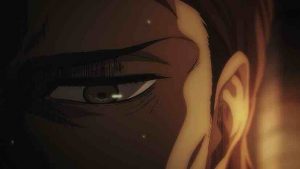 When the scope is wider I really struggle with Shingeki at this point. Simply because I don’t want to root for either of these main sides, and there’s only so much interest I can hold in a fight where I want both sides to lose. The series does better when it zooms in individuals being ground in the gears of stupidity, especially the ones who haven’t been tainted by being immersed in the narrative since the beginning. This is where Attack on Titan comes closest to an essential truth, I think – it does seem to recognize that the real victims of war are those who never wanted any part of it in the first place. What’s missing in my view is an adequate sense of blame, and a sense of where to point it.
When the scope is wider I really struggle with Shingeki at this point. Simply because I don’t want to root for either of these main sides, and there’s only so much interest I can hold in a fight where I want both sides to lose. The series does better when it zooms in individuals being ground in the gears of stupidity, especially the ones who haven’t been tainted by being immersed in the narrative since the beginning. This is where Attack on Titan comes closest to an essential truth, I think – it does seem to recognize that the real victims of war are those who never wanted any part of it in the first place. What’s missing in my view is an adequate sense of blame, and a sense of where to point it.
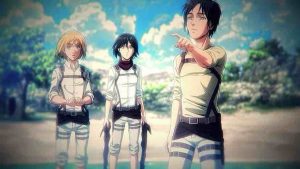 I did hate Gabi to bits when she was first introduced, as long-time readers may remember. Her voice is still like squeaky styrofoam to me but she’s been appropriately beaten down to size by the narrative. At least Gabi has the sense to realize that she’s been dedicating her life to a lie told by agents of abject evil, and the decency to be mortified over her role in the atrocities those agents have committed. Falco is something close to a blameless character, a true rarity in SnK. He never really set his sights on anything high-minded – he just wanted to stay alive and keep his crush from getting herself killed, and he paid the price for it.
I did hate Gabi to bits when she was first introduced, as long-time readers may remember. Her voice is still like squeaky styrofoam to me but she’s been appropriately beaten down to size by the narrative. At least Gabi has the sense to realize that she’s been dedicating her life to a lie told by agents of abject evil, and the decency to be mortified over her role in the atrocities those agents have committed. Falco is something close to a blameless character, a true rarity in SnK. He never really set his sights on anything high-minded – he just wanted to stay alive and keep his crush from getting herself killed, and he paid the price for it.
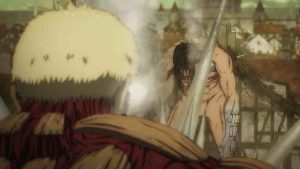 A small moment of decency like Nile-san turning Falco over to his brother is spit in this ocean of depravity, but it has an outsized impact on the mood because of that. Truthfully Nile has to realize Falco doesn’t have much more chance of surviving this than he does, and all he’s likely doing is giving him the chance to say goodbye to his brother. But most people are so powerless in these situations that a nearly-meaningless act of kindness is probably the most impact they’ll ever have the chance to have. Kudos to him for choosing to commit that act.
A small moment of decency like Nile-san turning Falco over to his brother is spit in this ocean of depravity, but it has an outsized impact on the mood because of that. Truthfully Nile has to realize Falco doesn’t have much more chance of surviving this than he does, and all he’s likely doing is giving him the chance to say goodbye to his brother. But most people are so powerless in these situations that a nearly-meaningless act of kindness is probably the most impact they’ll ever have the chance to have. Kudos to him for choosing to commit that act.
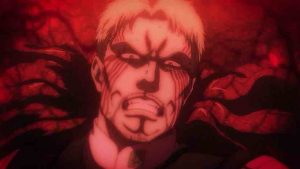 Virtually everyone in the main cast has been dead/not dead so many times that I’m not making any assumptions about any of them, including Zeke. I may not want either side to win but I still have a morbid curiosity to see how all this is going to turn out, and whether indeed Eren’s cooperation with the Jaegerists is going to turn out to be an asspull. I suppose I should be rooting for that just because it would mean Armin hasn’t turned into a complete idiot, which isn’t much to hang your hat on. For a series that’s built its legend on delivering shock and awe, it’s sort of ironic that in the end the smaller it goes the better it gets.
Virtually everyone in the main cast has been dead/not dead so many times that I’m not making any assumptions about any of them, including Zeke. I may not want either side to win but I still have a morbid curiosity to see how all this is going to turn out, and whether indeed Eren’s cooperation with the Jaegerists is going to turn out to be an asspull. I suppose I should be rooting for that just because it would mean Armin hasn’t turned into a complete idiot, which isn’t much to hang your hat on. For a series that’s built its legend on delivering shock and awe, it’s sort of ironic that in the end the smaller it goes the better it gets.


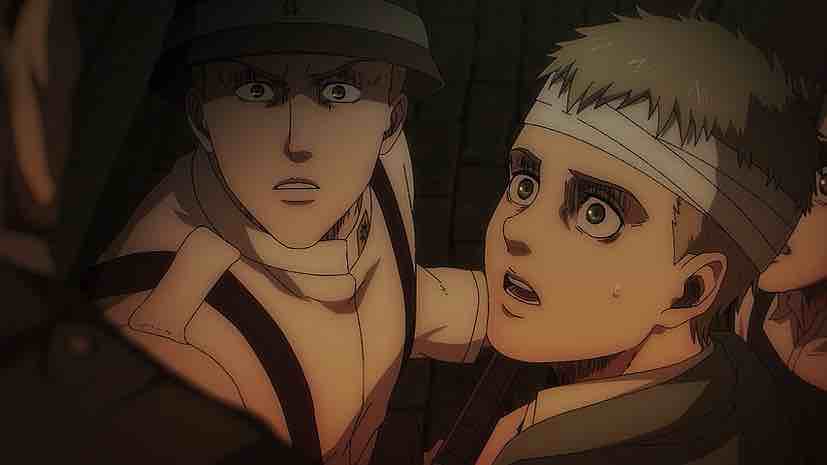
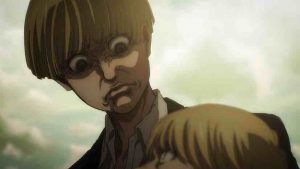
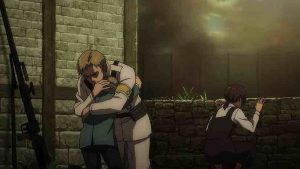
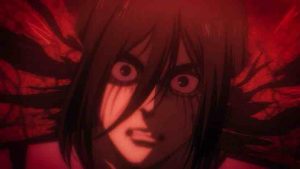
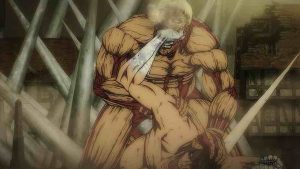
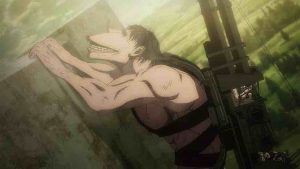
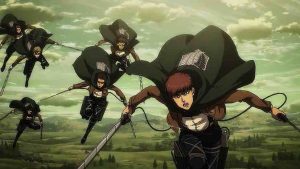
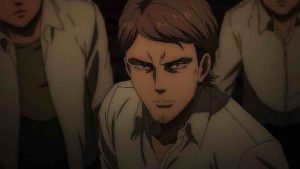
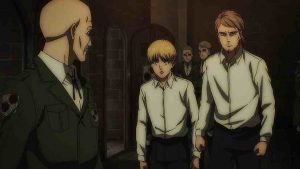
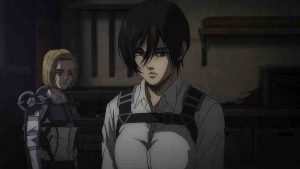
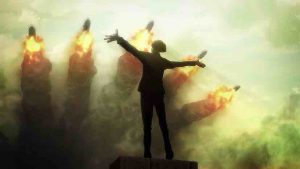
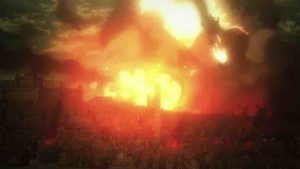
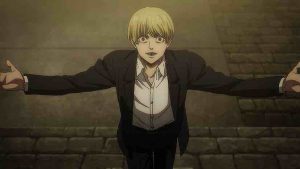
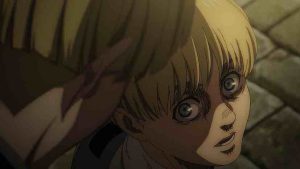
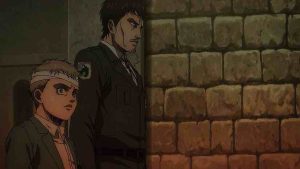
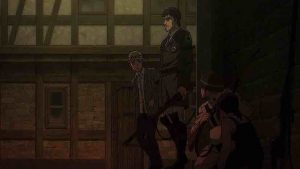
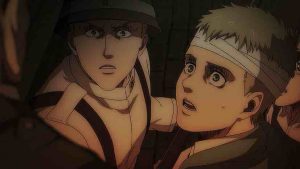
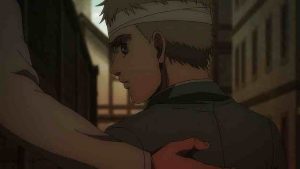
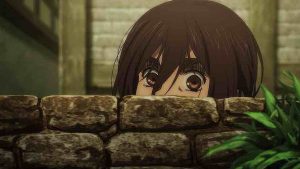
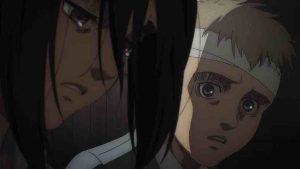
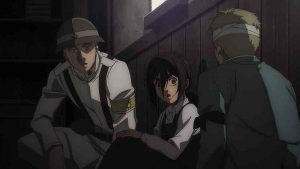
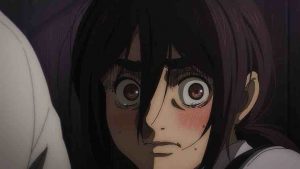
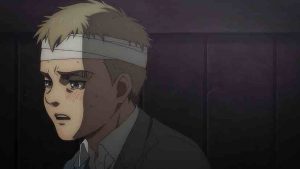
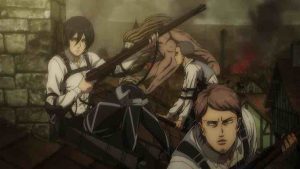
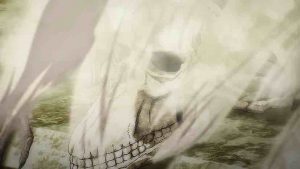
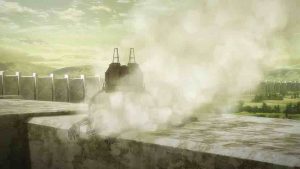
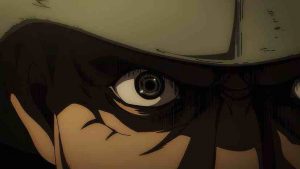
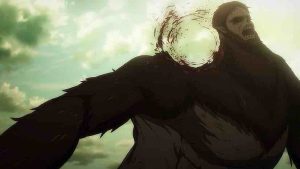
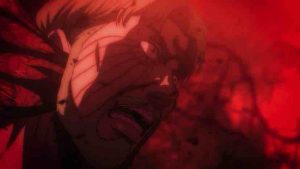
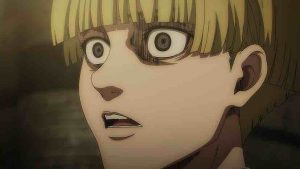
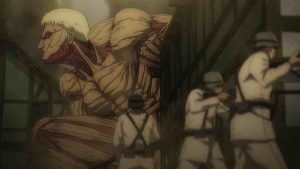
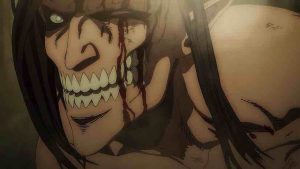
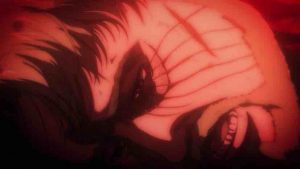
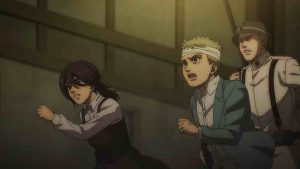


Marty
January 18, 2022 at 10:30 pmThis might sound irrelevant or out of pocket, but in my personal, biased, opinión, Attack on Titan is an exercise in nihilism or at least pessimissim; almost everyone is either a piece of Trash, complacent, or made out to be a fool/killed if they are neither of the two.
In a way this series is the polar opposite of something like “Welcome to Demon School, Iruma,” whose Thematic core centers around optimism and the power of kindness for its own sake. AoT is as relentlessly hopeless as Iruma is hopeful.
Guardian Enzo
January 18, 2022 at 10:56 pmI don’t think that’s an especially precarious limb you’re out on there!
Simone
January 25, 2022 at 8:52 amI don’t think the *people* are that bad IMO – a lot of them would be decent or have overall good motives if not for the horrible systems they find themselves trapped in. Gabi here is an example, but so are Reiner and for that matter Eren and Zeke. All committed atrocities, all did so fully convinced that it was the only way to do good by their friends and families, or forced by circumstances. There are a few who are more villainous (as in, they DID have a choice, and chose evil), but a lot of others are just trapped in the consequences of the bad choices of someone else.
sonicsenryaku
January 25, 2022 at 12:39 pm@Simone Yea exactly; and all of that causality is absolutely evident in the writing; all one needs is to trace the events depicted in the story to motivations that are made clear and fully backed by choices and actions rooted in a logical progression of events
Elia Notari
January 19, 2022 at 12:34 amMan, I’d really love to hear your thoughts on something like Warhammer 40k
Orion Taylor
January 22, 2022 at 1:22 amI’m really glad you are still reviewing SnK. I have nothing insightful to say about this weeks episode, but I’m really looking forward to reading your reaction to the series’ conclusion.
Guardian Enzo
January 22, 2022 at 12:27 pmLet’s hope I can hold out that long! It’s the plan for now, anyway.